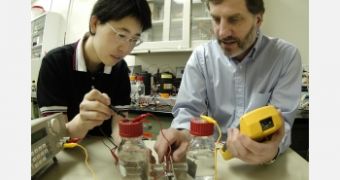The process is somehow similar to that which involves the wastewater cleaning operation, but tweaked a little, so that common bacteria that clean the waters will produce hydrogen instead, in a new efficient way. An experiment conducted at Penn State University has already successfully used microbes to produce electric power. The starter material could be salad bar, out of which the microbes will extract hydrogen.
Hydrogen fuel is essential for the development of the fuel cell cars industry, which can provide us with a reliable source of transport and eliminate pollution at the same time. Hydrogen and oxygen react in a fuel cell, to produce electricity which powers the electric engines. But producing hydrogen by electrolysis also involves consuming a fair amount of energy. By improving the bacteria conditions and adding a jolt of electricity, they can produce hydrogen at new record levels, for this type of hydrogen production system.
This was mainly achieved by testing different sources of organic matter and obtained a hydrogen yield of 91 percent out of vinegar and 68 percent out of cellulose. By using certain matter configurations, almost all the hydrogen contained in the molecules can be converted into usable gas and the high production efficiency could open the way to the large scale production.
So far, the developer of the new organic mix from which hydrogen can be extracted, Bruce Logan of the Penn State University, is leading the research in the area of the sustainable energy. This system can produce hydrogen on a large scale with incredible energy efficiency. The US has been supporting research in the microbial fuel cells for years, for a way to escape from the energy dependency and is now obtaining incredible results.
Applying low levels of energy, the process will ultimately produce more energy as a fuel than the electricity needed to run the reactor. Overall the vinegar-fueled system is 80 percent more efficient than the alternative fuel, ethanol and electrolysis hydrogen extraction techniques cannot be compared to that of the new system.
Scientists think that by better improving the efficiency of the new system and perfecting the environment for the bacteria, this new approach could be ten times more efficient than standard electrolysis.

 14 DAY TRIAL //
14 DAY TRIAL //